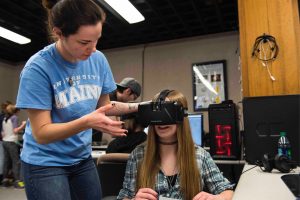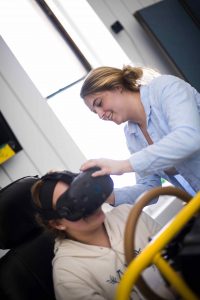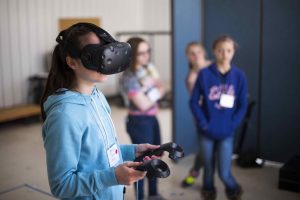Middle School Girls Explore the VEMI Lab
 On Thursday, March 16, over 500 middle school girls visited the UMaine campus for the College of Liberal Arts & Sciences’ annual Expanding Your Horizons day. Expanding Your Horizons is a one-day conference focused on providing middle school girls with opportunities to connect with women who are in under-represented career fields including science, engineering, mathematics and technology.
On Thursday, March 16, over 500 middle school girls visited the UMaine campus for the College of Liberal Arts & Sciences’ annual Expanding Your Horizons day. Expanding Your Horizons is a one-day conference focused on providing middle school girls with opportunities to connect with women who are in under-represented career fields including science, engineering, mathematics and technology.
Among the many opportunities provided throughout the day was an interactive visit to UMaine’s VEMI Lab. At the VEMI Lab, the middle schoolers were introduced to a variety of technologies and research projects that included virtual reality, 3-D printing, and environmental awareness simulations. The VEMI Lab program was organized and facilitated by members of UMaine’s Association for Computing Machinery-Women (ACM-W) chapter, a group of undergraduate and graduate students within the School of Computing and Information Science and New Media. There are ACM-W chapters across the world, including 123 in the United States, and the mission of ACM-W is to celebrate, support and advocate for the full engagement of women in all aspects of the computing field.
Chapter president and Ph.D. candidate, Stacy Doore, kicked off the one-hour session by highlighting the research done at the VEMI Lab and pointing out the different technologies available for the students to explore. Most of the young girls had never been exposed to computer science, so the virtual reality systems and 3-D printer were strange to them. One of the girls raised her hand to voice the confused consensus – “Can you make video games here?”
The answer is yes, of course, and the girls interacted with several fun virtual reality simulators. Katie Manzo, an undergraduate computer science major and vice president of the ACM-W chapter, introduced the girls to the lab’s driving simulator. One by one the girls put on their VR headset and climbed into the simulator, destroying digitally rendered cones and stop signs as they drove around a test track.
“I was really driving!” exclaimed one girl.
Another station introduced the girls to the visceral thrills of VR, as they explored a VR simulated room before a giant’s foot came crashing through the roof and ending the simulation. The experience proved too scary for some of the girls.
New Media major Toni Kaplan, who will soon be pursuing a Ph.D. at Carnegie Mellon, showed off the lab’s 3-D printer by printing a half-shark, half-man figure, “because we only do really important stuff here,” according to Kaplan.
Kaitlyn Haase, a graduate student in information systems and former math teacher, introduced the girls to augmented reality.
“It’s important to expose young girls to technology and science,” said Kaitlin.
“When I started my program I was the only girl in the class. Then I joined the ACM-W chapter, and it’s a great group. We’re all very enthusiastic about what we do. And the VEMI Lab is a fun space for the girls to visit and they can see people like them actively working on solutions to real problems using math and science.”
By the end of the session, the girls began making connections between the technologies they were interacting with and real problems. Graduate student Kendra Bird showed the students her research into spatial technology and environmental awareness, in which the girls were asked to identify the locations of sounds as they moved around a 360-degree speaker system. One of the girls asked Kendra if her research could be used to study how blind and deaf people experience their environments. The girls were beginning to see the possible applications of technology beyond just video games.
 Women are extremely underrepresented in STEM professions. In computing and information science the numbers are even starker, as women comprise only 18% of all degrees earned in that field. Getting more girls interested in computing at a young age is critical to increasing the number of women in the growing computing workforce. In Maine alone, there are currently over a thousand open computing jobs, but the state produces less than a hundred computer science graduates each year, of which less than 10% are female.
Women are extremely underrepresented in STEM professions. In computing and information science the numbers are even starker, as women comprise only 18% of all degrees earned in that field. Getting more girls interested in computing at a young age is critical to increasing the number of women in the growing computing workforce. In Maine alone, there are currently over a thousand open computing jobs, but the state produces less than a hundred computer science graduates each year, of which less than 10% are female.
“If these girls don’t get involved in early math and science classes, it’s very difficult to get them involved later,” said Stacy Doore. “It’s great for them to come to campus and see a lot of women doing a lot of different things in STEM.”
After the girls collected their VEMI Lab swag and finished off the remaining snacks, Doore asked the group if any of them were now thinking about studying computer science and new media. Half the girls raised their hands and that’s a good start.
